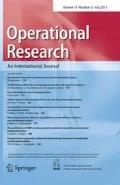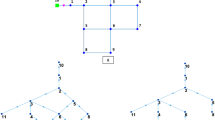Abstract
The Rule Based Expert Systems (RBES) constitute a powerful tool to support the decision making procedures in cases where there is not the desirable degree of structure (unstructured or semi-structure) stemming from the fact that the problem of decision-making is complex or there is no formed decision or there is no step-by-step procedure that can be used to support the Decision Maker effectively. This paper presents a real world case study regarding the management of the water supply meters network, which constitutes an unstructured problem of decision-making. The application of a Rule Base Expert System encapsulating knowledge obtained from the data analysis of the Consumer Recording system as well as from the expression of expert knowledge was an efficient solution in determining the meters suspected of under-recording water consumption as well the degree of under-measurement. Finally this research work concludes with the design of a schedule for the replacement and maintenance of the water consumption meters. The system NeMO (Network Measurement Optimisation), a Rule Based Expert Systems, was developed for this Decision Problem with the aim of providing both a cost-effective way and an efficient tool to improve the precise accuracy of water measurement and the relative positive results for the water supply organization.
Similar content being viewed by others
References
Dicken, H.K. and H.P. Newquist (1985), AI Trends ’85, Scottsdale, AZ:DM Data.
Doukidis, G.I. and RJ. Paul (1992), Artificial Intelligence in Operational Research, MacMillan.
Elam, J.J. and B. Konsynski (1987), Using AI techniques to enhance the capabilities of model management systems, Decision Sciences, Summer 1987.
Henderson, J.C. (1987), Finding Synergy between Decision Support Systems and Expert Systems, Decision Sciences.
Hawkins, H (1998) Data Warehousing Architecture and Implementation, Publisher: Prentice Hall PTR, First Edition
Macro, D. (2000) Building and Managing the Meta Data Repository: A Full Lifecycle Guide, Wiley Computer Publishing, John Wiley & Sons, Inc.
Jelassi, M.T. (1986), MCDM: From ‘Stand-Alone’ methods to integrated and Intelligent DSS, proceedings of the VII-th International Conference on Multiple Criteria Decision Making, 1, 250–259.
King, D. (1989), Modeling and Reasoning: Integrating Decision Support with Expert Systems, in Leibowitz, J. (ed) Expert Systems for Business and Management, Englewood Cliffs, NJ: Prentice-Hall.
Ko, C. and T.W. Lin (1988), Multiple Criteria Decision making and Expert Systems, in Turban, E. and P. Watkins (eds), Applied Expert Systems, Amsterdam, North-Holland.
Malach, (2000), Decision support and data warehouse systems, McGraw Hill.
Matsatsinis, N.F. and Y. Siskos (1999), MARKEX: an intelligent decision support system for product development decisions, European Journal of Operational Research, vol. 113, no. 2, pp. 336–354.
Matsatsinis N.F. and Y. Siskos (2003), Intelligent support systems for marketing decision, Kluwer Academic Publishers.
Pomerol, J.Ch., B. Roy, C. Rosenthal-Sabroux and A. Saad (1995), An “intelligent” DSS for the multicriteria evaluation of railway timetables, Foundation of Computing and Decision Science, 20, 3, 219–238
Sage, A.P. and A. Lagomasino (1986), Computer based Intelligence Support: An Integrated Expert System and Decision Support Approach, in Silverman, B.G. (ed) Expert Systems for managers
Siskos, Y., A. Spyridakos and D. Yannakopoulos, 1999, Using artificial intelligent techniques into preference disaggregation analysis: The MIIDAS system, European Journal of Operation Research 113 (1999) 281–299
Siskos, Y. and A. Spyridakos (1999), Intelligent Multicriteria Decision Support: Overview and Perspectives, European Journal of Operational Research. 113, 236–246
Tabachnick, B. and L. Fidell (1989), Using Multivariate Statistics, Second Edition, Harper Collins Publishers,
Tate, J. (1999), Water supply in UK: Towards a more sustainable future? Sustainable development, 8, 3, 155–164.
Turban, E. (1993), Decision support and expert systems: management support systems, Third Edition, McMillan.
Turban, E., J.R. Aronson and T.P. Liang (2004), Decision support systems and intelligent systems, seventh edition, Prentice Hall.
Weimer, D. (2001), German National Report: Water loss management and techniques,
Zopounidis, C., N.F. Matsatsinis, M. Doumpos (1996), Developing a multicriteria knowledge-based decision support system for the assessment of corporate performance and viability: The FINEVA system, Fuzzy Economic Review, vol. 1, no. 2, pp. 35–53.
Water measurement manual: A water resources technical publications (1997), 3rd edition, U.S. Department of Interior, Bureau of Reclamation, Denver, Co: Government Printing Office. http://www.usbr.gov/pmts/hydraulics_lab/pubs/wmm/index.htm
Author information
Authors and Affiliations
Rights and permissions
About this article
Cite this article
Spyridakos, T., Pierakos, G., Metaxas, V. et al. Supporting the management of measurement network with an expert system: The NeMO system. Oper Res Int J 5, 273–288 (2005). https://doi.org/10.1007/BF02944313
Issue Date:
DOI: https://doi.org/10.1007/BF02944313




